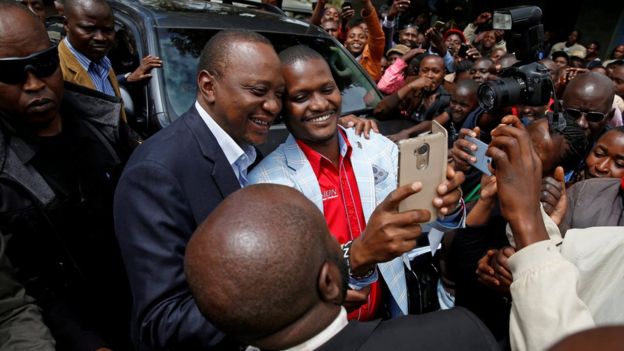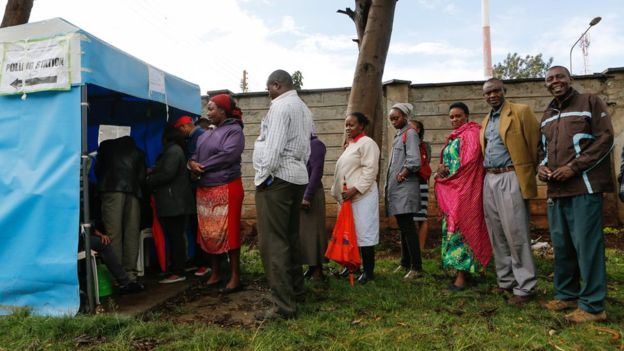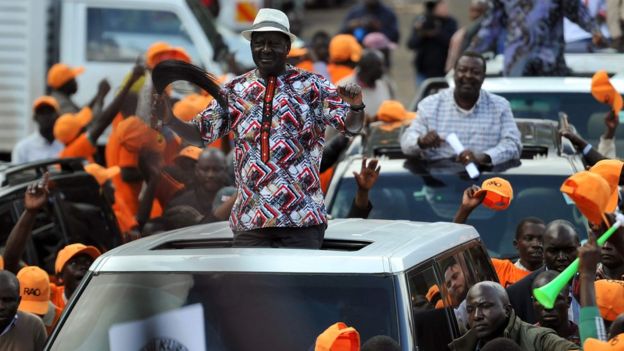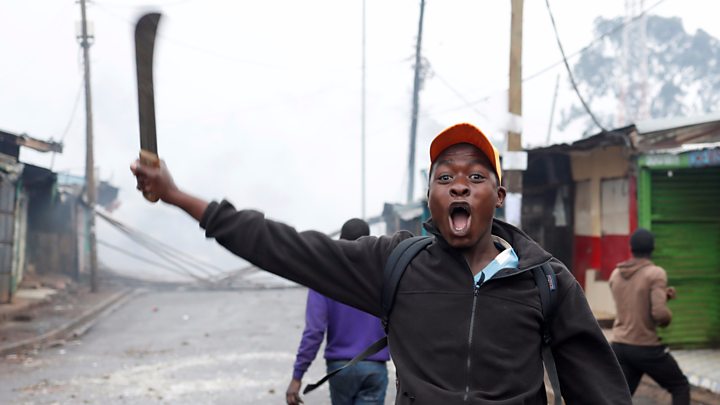Kenya Election: Voting Marred By Boycott
Kenya’s presidential election re-run has been marred by isolated clashes and a boycott by the main opposition.
A teenage boy was shot by police and later died amid clashes in the opposition stronghold of Kisumu, one of four counties hit by violence.
The electoral commission said voting in those areas would be postponed until Saturday.
President Uhuru Kenyatta was declared the winner in an August vote, which was annulled because of “irregularities”.
Mr Kenyatta is seeking a second term. Opposition leader Raila Odinga has pulled out of the contest.
Tens of thousands of police and other security staff deployed to protect voters and polling stations, which closed at 17:00 local time (14:00 GMT).
International observers have scaled down their missions for security reasons.
The electoral commission has seven days to declare the results.
After casting his vote in the town of Gatundu, Mr Kenyatta had urged people to cast their ballots so the country could move on.
“We’re tired as a country of electioneering. It’s time we moved forward,” he said, adding that most of the country was “calm and peaceful”.
Kisumu Governor Peter Anyang’ Nyong’o, father of the Oscar-winning actress Lupita Nyong’o, said 29 people had been injured and two killed by police.
Bullets and teargas
BBC’s Emmanuel Igunza at the scene in Kisumu

Live rounds have been fired by police in the opposition stronghold of Kisumu, in western Kenya, killing at least one person.
Nineteen-year-old George Odhiambo was brought to the main hospital in Kisumu bleeding heavily from a thigh wound. His brother told me that they had been sitting outside their house watching opposition demonstrations when he was shot. Four other patients nursing gunshot wounds are all in a stable condition.
We’ve been coming across pockets of protesters as we drive around the city – with police firing teargas to disperse them. Most people here have heeded the boycott call by the opposition and stayed at home, and many polling stations have been barricaded to stop any would-be voters.
A voting official in Kisumu told me just three of 399 polling station officials had turned up, fearing they might face intimidation for taking part in the election. A lone but determined voter came to the main polling distribution centre this morning to find out how he could vote as his polling station was closed.
What effect are ethnicities having?
BBC Kenya analyst Dickens Olewe says the ethnic divide can already be seen in the voting, with a high turnout so far in regions where President Kenyatta’s Kikuyu community and Deputy President William Ruto’s Kalenjin community reside.
In parts of western Kenya where Mr Odinga’s Luo community is mostly based, there is a near-100% boycott of the poll.
The electoral commission has postponed voting until Saturday in the western counties of Homa Bay, Kisumu, Migori and Siaya because of “security challenges”. These areas are all likely to continue observing the opposition’s boycott.
Ethnic-based politics is deep-seated in Kenya, fuelled by the illusion that if “one of us” is in power then people from that community will benefit, he says.
Some Kenyans may also feel Mr Odinga’s withdrawal makes the competition somewhat redundant; others may be just fed up with the ongoing political crisis – all factors that could affect the overall turnout, he adds.
What has happened since the first vote?
The announcement by the Independent Electoral and Boundaries Commission (IEBC) of Mr Kenyatta’s victory on 8 August led to inflammatory rhetoric and attacks on the body.
 Image copyrightREUTERS
Image copyrightREUTERSLast week, a senior member of the IEBC fled to the US amid death threats.
About 50 people are reported to have been killed in violence since Mr Kenyatta was declared the winner in August’s election.
Mr Odinga had wanted the repeat ballot to be held at a later date, but a bid to delay the election re-run fell apart after only two of seven Supreme Court judges attended a hearing on Wednesday.
One judge, Deputy Chief Justice Philomena Mwilu, failed to appear after her bodyguard was shot and wounded by unknown gunmen on Tuesday.
Why is there an election re-run?
Kenya’s Supreme Court took the unprecedented decision to annul the August presidential election and demand a re-run in September citing “irregularities and illegalities”.
 Image copyrightEPA
Image copyrightEPAChief Justice David Maraga said the election had not been “conducted in accordance with the constitution” and declared it “invalid, null and void”.
He said the verdict, which was backed by four of the six Supreme Court judges, found that the IECB had committed irregularities “in the transmission of results”.
The court said the result was “neither transparent nor verifiable”.
The ruling did not attribute any blame to President Kenyatta’s party or campaign but it nevertheless raised tensions, with rival protests in support of and against the court.
There were running battles between police firing tear gas and stone-throwing protesters in the city of Kisumu, an opposition stronghold, on Wednesday.
Why is the opposition boycotting?
Mr Odinga has said that the IECB failed to make the changes needed to prevent a repeat of the mistakes that marred the earlier poll, although the IECB disputes this.
His opposition coalition – the National Super Alliance (Nasa) – made clear its participation in the election was contingent on reforms being made.
 Image copyrightGETTY IMAGES
Image copyrightGETTY IMAGESMr Odinga had vowed to disrupt Thursday’s vote, calling for “massive” demonstrations, but has asked his supporters to stay away from polling stations in an attempt to avoid violent clashes.
In a statement earlier this month, he accused the government of instituting a “dictatorship”, adding: “We are going to win the battle for a free and fair election”.
“Our opponents want an election for the sake of it, we want a better election,” he said.







